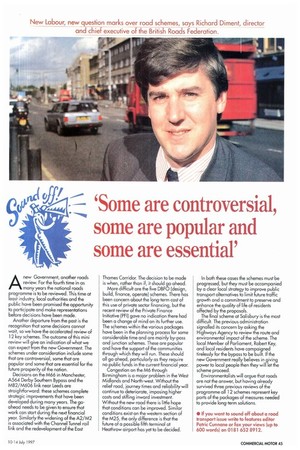'Some are controversial, some are popular and some are essential'
Page 47

If you've noticed an error in this article please click here to report it so we can fix it.
Anew Government, another roads review. For the fourth time in as many years the national roads programme is to be reviewed. This time at least industry, local authorities and the public have been promised the opportunity to participate and make representations before decisions have been made.
Another departure From the past is the recognition that some decisions cannot wait, so we have the accelerated review of 12 key schemes. The outcome of this mini review will give an indication of what we can expect from the new Government. The schemes under consideration include some that are controversial, some that are popular and some that are essential for the future prosperity of the nation. Decisions on the M66 in Manchester, A564 Derby Southern Bypass and the M82/M606 link near Leeds are straightforward: these schemes complete strategic improvements that have been developed during many years. The goahead needs to be given to ensure that work can start during the next financial year. Similarly the widening of the A2/M2 is associated with the Channel Tunnel rail link and the redevelopment of the East Thames Corridor. The decision to be made is when, rather than if, it should go ahead. More difficult are the five DBFO (design, build, Finance, operate) schemes. There has been concern about the long-term cost of this use of private sector financing, but the recent review of the Private Finance Initiative (PH) gave no indication there had been a change of mind on its further use. The schemes within the various packages have been in the planning process for some considerable time and are mainly by-pass and junction schemes. These are popular and have the support of the communities through which they will run. These should all go ahead, particularly as they require no public funds in the current financial year. Congestion on the M6 through Birmingham is a major problem in the West Midlands and North-west. Without the relief road, journey times and reliability will continue to deteriorate, imposing higher costs and stifling inward investment. Without the new road there is little hope that conditions can be improved. Similar conditions exist on the western section of the M25, the only difference is that the future of a possible Fifth terminal at Heathrow airport has yet to be decided. In both these cases the schemes must be progressed, but they must be accompanied by a clear local strategy to improve public transport alternatives to limit future traffic growth and a commitment to preserve and enhance the quality of life of residents affected by the proposals. The final scheme at Salisbury is the most difficult. The previous administration signalled its concern by asking the Highways Agency to review the route and environmental impact of the scheme. The local Member of Parliament, Robert Key, and local residents have campaigned tirelessly for the bypass to be built. If the new Government really believes in giving power to local people then they will let the scheme proceed. Environmentalists will argue that roads are not the answer, but having already survived three previous reviews of the programme all 12 schemes represent key parts of the packages of measures needed to provide long-term solutions.








































































































